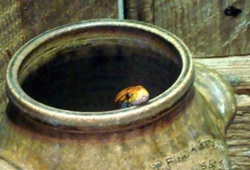 And the Lord said, "Hear what the unrighteous judge says. And will not God give justice to his elect, who cry to him day and night? Will he delay long over them? I tell you, he will give justice to them speedily. Nevertheless, when the Son of Man comes, will he find faith on earth?" (Luke 18:6-8) Jesus told two parables to his disciples regarding the nature of how they should pray:
0 Comments
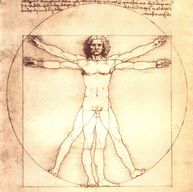 One of the blessings, or curses, of being human is the ability to question our very existence and then the nature of that existence. Whether humans choose to believe we are simply the most highly evolved life-form or the crown of God's creation, both materialists and theists have to agree that there is something unique about the creature known as Man1. 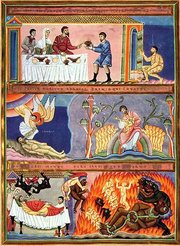 Codex Aureus of Echternach “The poor man [Lazerus] died and was carried by the angels to Abraham's side. The rich man also died and was buried, and in Hades, being in torment, he lifted up his eyes and saw Abraham far off and Lazarus at his side.” (Luke 16:22-23) While the story of Lazerus and the rich man is a parable, that doesn't negate the Truth elements depicted in it. Jesus is never known to fabricate or repeat myths even in his parabolic storytelling. Thus, even if the events described didn't happen historically (though Lazerus is the only named character in a parable), the  "One who is faithful in a very little is also faithful in much, and one who is dishonest in a very little is also dishonest in much. If then you have not been faithful in the unrighteous wealth, who will entrust to you the true riches? And if you have not been faithful in that which is another's, who will give you that which is your own? No servant can serve two masters, for either he will hate the one and love the other, or he will be devoted to the one and despise the other. You cannot serve God and money." (Luke 16:10-13). Trust with riches & relationships are earned. It's amazing how many people misinterpret this passage for Jesus' teaching here isn't rocket science.  “do you not know that your body is a temple of the Holy Spirit within you, whom you have from God? You are not your own, for you were bought with a price. So glorify God in your body. (1Corinthians 6:19-20) Paul outlined that God not only created us, but bought us back from the life of sin we chose over Him. While Paul is explicitly speaking of our physical bodies, it would seem natural to extend such a philosophy of indebtedness to every aspect of our lives, for if our own bodies are not our own, how much more so the skills and knowledge He gave us? The families and friends that bless us? The jobs and wealth that He has granted us? Should we not see ourselves as nothing more than stewards when it comes to every aspect of our lives? In this regard, we need to act more like the shrewd manager, that is thinking of my future, my eternal future. Each day we should be waking up and asking, how can we use these possessions and qualities that we've been granted authority over to impact my true home, the eternal Kingdom. Whether it be money, time, or talents, investing them back into the Kingdom from which they came, and to which we will live in for eternity, is the most logical approach. In the parable of the prodigal son whom does the father, the lost son, and the eldest son represent?2/22/2012 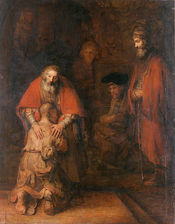 Rembrandt, The Lost Son “It was fitting to celebrate and be glad, for this your brother was dead, and is alive; he was lost, and is found.'" (Luke 15:32) The key to understanding the story of the prodigal sons is the context in which Jesus told the parable, which was a crowd of tax-collectors & sinners who “were gathering to hear him” and Pharisees & teachers of the Law who were muttering about why he'd hang around such shameful people. 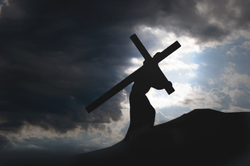 “If anyone comes to me and does not hate his own father and mother and wife and children and brothers and sisters, yes, and even his own life, he cannot be my disciple. Whoever does not bear his own cross and come after me cannot be my disciple.” (Luke 14:26-27) If anyone does not prioritize their calendar around loving Christ, they are not worthy to call themselves His disciple. Whoever is unwilling to be buried in unmarked grave as a traitor to their country for the name of Christ, is not worthy to be called Christ's disciple.  “For everyone who exalts himself will be humbled, and he who humbles himself will be exalted.” (Luke 14:11) At a dinner where Pharisees were scrambling for the “places of honor at the table” Jesus told a parable instructing them to take humble seats, for if the host asks them to move to a higher seat they will be exalted and if the host asks them to move to a lower seat they will be shamed before everyone. While this may come across as a sly way to get ahead by practicing a false humility in order for the host to publicly “indicate your intrinsic superiority” (Elwell, 825), v11 shows that Jesus was clearly illustrating the Kingdom law of “humility before honor,” which demands “self-humbling” and the elevation of others (Howell, 237).  “O Jerusalem, Jerusalem, the city that kills the prophets and stones those who are sent to it! How often would I have gathered your children together as a hen gathers her brood under her wings, and you would not! Behold, your house is forsaken. And I tell you, you will not see me until you say, 'Blessed is he who comes in the name of the Lord!'" (Luke 13:34-35). As Jesus marched to Jerusalem to face the cross, He lamented over the spiritual hardness of Jerusalem despite His mission to reach them and draw them into His arms like a mother hen cares for her chicks, summarizing His reaction to their track record of killing God's prophets. Then Jesus speaks a harsh word “Your house is left to you desolate,” which rings of judgment. Several interpretations have been offered for the meaning of 'house,' such as Bultmannn's interpretation as 'the world,' but “a better possibility is that the word refers to the temple” (Marshall, 576), which happened literally with the destruction of the temple in 70AD. Hindsight raises the question as to whether Jesus' words were prophetic in this regard. 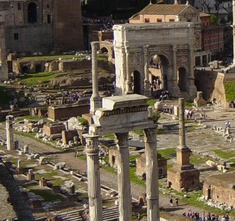 When Jesus was confronted with the evil and suffering of this world He took a radically different approach than other religions of the world. The prevailing notion since the time of Job (Job 22:5) was that “calamity visited upon people for their personal wickedness” (Howell, 231), in a system that for all intensive purposes probably inspired the Hindu notion of karma. Even Jesus' disciples and the Jewish Pharisees believed the blind man Jesus healed was born blind because either his parents sinned or “he was steeped in sin from birth” (John 9:1-2, 34). Jesus' forcefully dispelled this notion by claiming that the tragic events of the Galileans slaughtered by Pilate and those crushed by the fallen tower of Siloam were no guiltier than anyone else!  Jesus paints a picture of His second coming in terms of servants awaiting their master, not knowing when he will return from a wedding party. Faithful stewards who are prepared at all times, being wise and fair with the master's assets and other servants, are to be rewarded. This reward is lavish, which “envisions a reversal of roles that was unheard of in Palestine” (Elwell, 823) where the master served the servants. Furthermore, those who have proven themselves faithful with what they've been given, will be entrusted with more. On the contrary, unfaithful stewards, squandering their master's assets and abusing other servants will be punished. This punishment is severe, for they are even to be assigned with unbelievers! In fact, their punishment will be worse than unbelievers, for punishment will be according to the degree of one's knowledge. Whatever they have will be taken from them. The rewards and punishments will be intensified for those who have been given great gifts, since expectations of productivity are high because of those gifts. For those of us who know God's word, and know it to the extent that a seminary education has to offer, the stakes are high, which is why James warns against becoming teachers (James 3:1).  And [Jesus] he said to them, "Take care, and be on your guard against all covetousness, for one's life does not consist in the abundance of his possessions" (Luke 12:15). How Jesus might have told a modern crowd this parable: “The company of certain rich businessman produced large profits. He thought to himself, 'What shall I do? I've made it to the top.' Then he said, 'This is what I'll do. I will sell my firm and retire, and there I will build a house 'spare-no-expense' and join a country club. And I'll say to myself, 'You have plenty of money invested for many years. Take life easy; eat at 5-star restaurants, drink imported wine and enjoy all that life has to offer.' Bud God said to Him, 'You fool! This very night you will have a stroke and die. Then who will inherit your stocks, annuities, and properties?'”  Jan Vermeer van Delft, 1654 “But the Lord answered her, "Martha, Martha, you are anxious and troubled about many things, but one thing is necessary. Mary has chosen the good portion, which will not be taken away from her." (Luke 10:41-42) While caricatures of Martha and Mary are not provided in scripture, they seem to fit personality types of people in our own lives. In this, drawing conclusions is merely speculation, but the implications of the parallels these sisters have on our own lives, we might just gain a glimpse as to what Jesus' might say to us. |
AuthorBrett Yardley: Categories
All
Archives
January 2019
|
